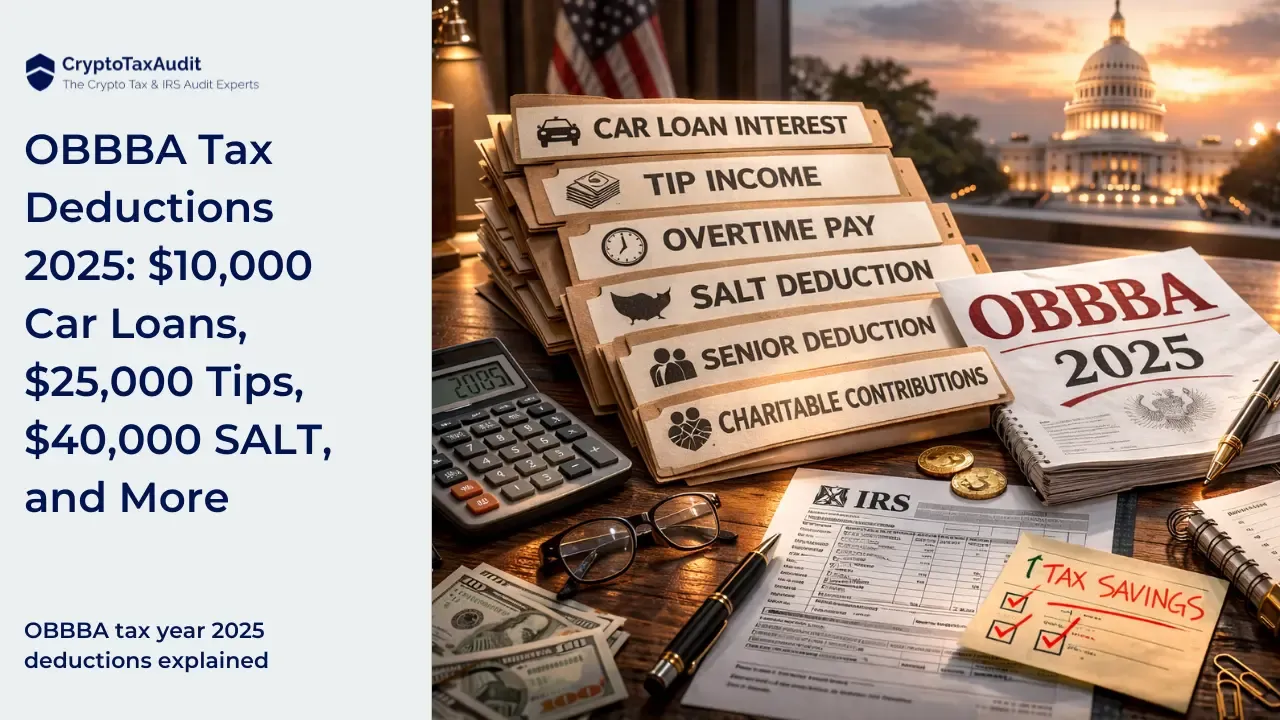
The IRS Is Broken: A Tax Attorney's Brutal Take on Crypto, Corruption, and Control
Key Takeaways:
- The IRS is shifting from civil audits to fear-based enforcement, especially targeting crypto investors.
- Third-party data from offshore exchanges is being used without notice to build criminal cases.
- Inheritance of crypto through self-custodied wallets is creating massive compliance risks.
- The new "Big Beautiful Bill" adds complexity, surveillance, and loopholes instead of simplifying crypto taxation.
What happens when one of the nation’s top international tax attorneys compares the IRS to an abusive spouse?
You stop what you’re doing and listen.
In a raw, wide-ranging conversation, Clinton Donnelly of CryptoTaxAudit and Anthony Parent of IRSMedic break down what’s really happening inside the IRS—and why crypto investors should be paying close attention.
While Anthony focuses on audit abuse and government overreach, Clinton highlights how crypto enforcement is accelerating behind the scenes.
How did Anthony Parent become a leading voice in IRS audit defense and international tax enforcement?
Parent didn’t stumble into tax law. He built a practice with his father—a federal agency veteran who knew how to work the system and disarm auditors while gutting their cases from the inside.
Together, they took on some of the most complex international tax situations the IRS could throw at them. And won.
While Parent doesn’t focus on crypto, his audit defense experience overlaps with the broader IRS trend: fewer agents, more automation, and a tilt toward intimidation.
Is the IRS now using fear as a primary enforcement strategy?
"The IRS is acting like an abusive spouse," Parent says. "First, they trap you financially. Then they gaslight you into thinking you need them."
That abusive model now defines tax enforcement.
It’s no longer about compliance.
It’s about extracting revenue with minimal effort. Slam-dunk penalties, quick FBAR fines, and scare letters sent en masse to crypto investors who don’t know their rights.
Parent has seen it firsthand: $200,000 FBAR penalties issued over minor reporting errors.
Criminal cases built on flimsy technicalities. Civil exams skipped entirely in favor of criminal threats.
The IRS has fewer agents than ever—so they’re just picking easy targets and hoping they fold.
How is the IRS using offshore data to target crypto investors?
Clinton Donnelly of CryptoTaxAudit, whose firm specializes in crypto gain calculations, tax preparation, and audit defense when needed, explains how enforcement has evolved.
Letters like 6173 and 6174-A aren’t just notices—they’re precursors to deeper scrutiny and potential criminal exposure.
The IRS is using third-party data, often from criminal investigations, to build cases before taxpayers even know they’re being watched.
You won’t always get a notice. You may not get a chance to respond before they indict.
One recent case highlighted this reality: Roger Ver, an early crypto investor and entrepreneur who renounced his U.S. citizenship.
Clinton asks for Anthony Parent’s take on the Roger Ver case—and Parent doesn’t hold back.
Ver renounced his U.S. citizenship a decade ago.
The IRS waited until the very last day of their 10-year window to bring charges.
What for?
Allegedly misreporting the value of his Bitcoin on the day he expatriated.
Never mind that Mt. Gox had just collapsed and the market was in freefall.
According to Parent, the timing wasn’t about justice—it was about making an example.
Is crypto inheritance creating a massive tax compliance gap?
Clinton sees another storm brewing: crypto inheritance.
With self-custodied wallets and no institutional reporting, many heirs inherit digital assets off the books.
"Dad dies with $10 million in BTC on a hardware wallet. The son plugs it in, transfers the funds, and no one knows," he explains. "No probate. No 1099. No audit trail. And no tax."
It’s legal. But for how long?
What’s inside the ‘Big Beautiful Bill’ as it nears final passage—and why crypto investors should care?
Parent critiques the Trump-backed tax bill, which recently passed the Senate but still awaits final approval in the House.
While it was pitched as a reform to eliminate the IRS, end double taxation for expats, and reduce audits, the version moving toward final passage reflects something else entirely.
The final version added more carve-outs, more loopholes, and increased surveillance.
Like a new 3.5% excise tax on money sent abroad—which, if you know crypto, is easy to dodge.
"This is a tax on the unsophisticated. If you know how to move crypto, you’re fine. If not, you’re the target."
Why proactive defense is your best move now
The IRS is ramping up enforcement, and crypto investors are a prime target.
You don’t get a warning—you get a letter, a subpoena, or worse. That’s why taking action before they show up is critical.
At CryptoTaxAudit, we don’t just calculate gains—we build defenses.
Our team specializes in precise crypto gain calculations, high-stakes tax preparation, and real audit protection.
This isn’t tax software. This is tax survival for serious investors.
Don’t give the IRS an opening. Visit CryptoTaxAudit.com and protect your portfolio today.
Related Articles: IRS Letters 6173, 6174, 6174-A Explained: Essential Info for Crypto Traders and Investors
FAQs
What happens if the IRS gets my info from Binance or another offshore exchange?
If it comes through a criminal investigation, they may not be required to notify you. You could go straight from silence to subpoena.
Can I inherit crypto without triggering tax?
It depends. If it’s self-custodied and undocumented, it may bypass probate. But if the IRS discovers it, you could face gift tax, inheritance tax, or even fraud allegations.
I got a 6173 letter. Should I sign it?
Absolutely not—not without a crypto tax expert reviewing your situation. Signing could waive your rights and open you up to audit or criminal charges.
What’s the IRS really after?
Slam-dunk wins. They want cases that are cheap, fast, and intimidating. That’s why crypto holders are squarely in their sights.
How can CryptoTaxAudit help?
CryptoTaxAudit is the only firm built specifically for crypto investors who want to stay compliant, minimize taxes, and stay protected. We go beyond generic tax tools—we specialize in precise crypto gain calculations, advanced tax preparation, and real audit defense when it matters most. If you’ve received an IRS letter, are behind on reporting, or just want to bulletproof your filings, take action now. Visit CryptoTaxAudit.com and protect your portfolio today.





